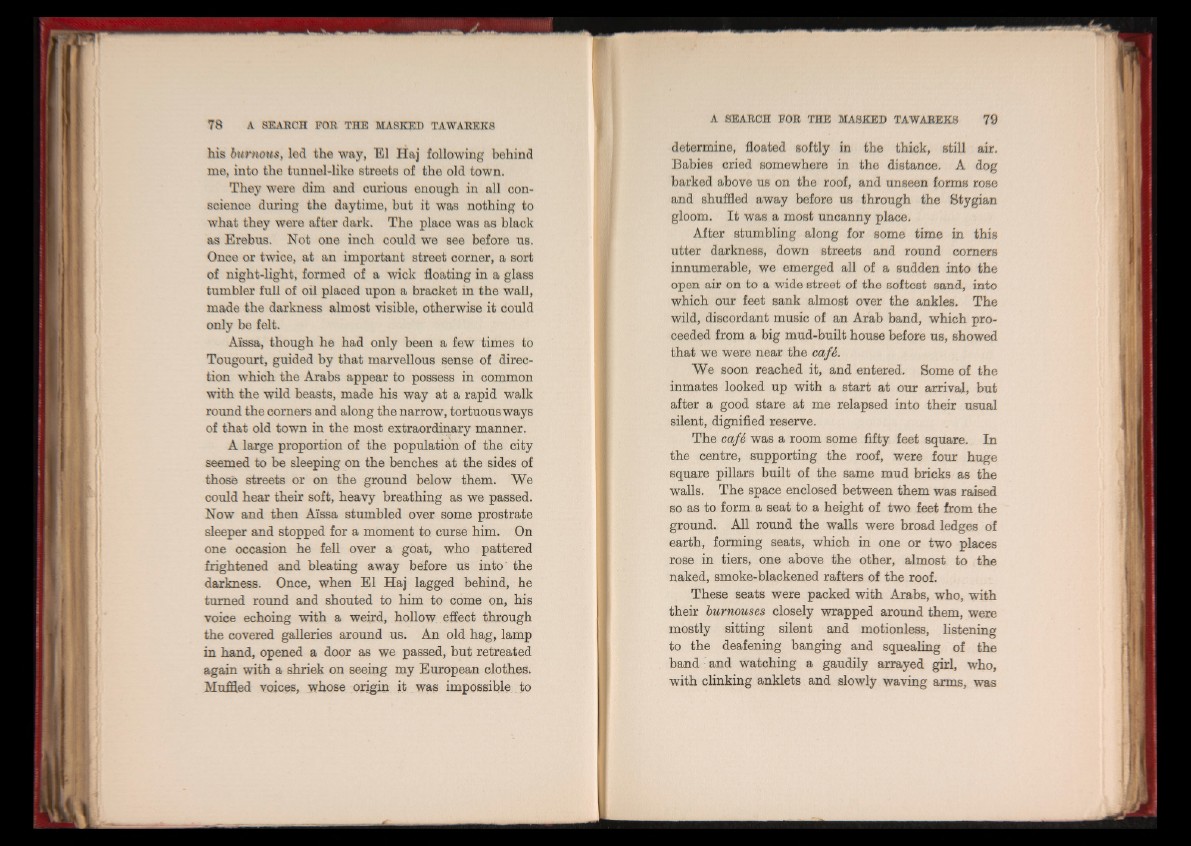
his burnous, led the way, El Haj following behind
me, into the tunnel-like streets of the old town.
They were dim and curious enough in all conscience
during the daytime, but it was nothing to
what they were after dark. The plaoe was as black
as Erebus. Not one inch could we see before us.
Once or twice, at an important street oorner, a sort
of night-light, formed of a wick floating in a glass
tumbler full of oil placed upon a bracket in the wall,
made the darkness almost visible, otherwise it could
only be felt.
Aissa, though he had only been a few times to
Tougourt, guided by that marvellous sense of direction
which the Arabs appear to possess in common
with the wild beasts, made his way at a rapid walk
round the comers and along the narrow, tortuous ways
of that old town in the most extraordinary manner.
A large proportion of the population of the city
seemed to be sleeping on the benches at the sides of
those streets or on the ground below them. We
could hear their soft, heavy breathing as we passed.
Now and then Aissa stumbled over some prostrate
sleeper and stopped for a moment to curse him. On
one occasion he fell over a goat, who pattered
frightened and bleating away before us into the
darkness. Once, when El Haj lagged behind, he
turned round and shouted to him to come on, his
voice echoing with a weird, hollow effect through
the covered galleries around us. An old hag, lamp
in hand, opened a door as we passed, but retreated
again with a shriek on seeing my European clothes.
Muffled voices, whose origin it was impossible... to
determine, floated softly in the thick, still air.
Babies cried somewhere in the distance. A dog
barked above us on the roof, and unseen forms rose
and shuffled away before us through the Stygian
gloom. It was a most uncanny place.
After stumbling along for some time in this
utter darkness, down streets and round comers
innumerable, we emerged all of a sudden into the
open air on to a wide street of the softest sand, into
which our feet sank almost over the ankles. The
wild, discordant music of an Arab band, which proceeded
from a big mud-built house before us, showed
that we were near the café.
We soon reached it, and entered. Some of the
inmates looked up with a start at our arrival, but
after a good stare at me relapsed into their usual
silent, dignified reserve.
The café was a room some fifty feet square. In
the centre, supporting the roof, were four huge
square pillars built of the same mud bricks as the
walls. The space enclosed between them was raised
so as to form a seat to a height of two feet from the
ground. All round the walls were broad ledges of
earth, forming seats, which in one or two places
rose in tiers, one above the other, almost to the
naked, smoke-blackened rafters of the roof.
These seats were packed with Arabs, who, with
their burnouses closely wrapped around them, were
mostly sitting silent and motionless, listening
to the deafening banging and squealing of the
band and watching a gaudily arrayed girl, who,
with clinking anklets and slowly waving arms, was